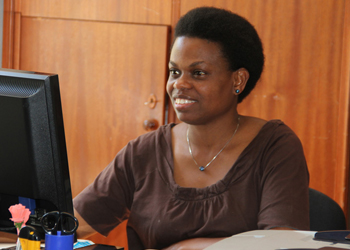Ubuntu lives

Developed by the Padre António Vieira Institute and supported from the outset by the Calouste Gulbenkian Foundation, the ALU project was recently identified by the European Commission as an exemplary case of best practice for all of Europe. Distinguished from between 114 projects within the scope of working with young people and the field of entrepreneurial learning in all of Europe, ALU was the only “case study” of success nominated from the Iberian Peninsula.
Launched in 2010, the project empowers young people with high leadership potential, either raised in contexts of social exclusion or with specific aptitudes for working in them. According to a non-formal education methodology, the project puts the Ubuntu Method into practice, which derives from the concept of “I am because you are / I can only be a person through other persons”, placing particular emphasis on five training dimensions: self-knowledge, self-confidence, resilience, empathy and service.
The models of reference play a central role in this project: participants study and reflect on the life stories of leaders with global profiles, including Nelson Mandela, Martin Luther King, Mahatma Gandhi, Mother Teresa of Calcutta, Desmond Tutu, Malala Yousafzai and Aristides de Sousa Mendes. Through its innovative methodology and tools, the ALU has contributed towards the acquisition of competences by young people, helping them to overcome their personal challenges and affirming their position as agents of transformation within the heart of their communities. Mamadú, Eugénia and Sofia are just three of the stories from the universe of leaders that this Academy has already trained.
“This enabled me to find a way of life”
Mamadú Saibana Baldé, aged 31
‘Tchintchor’ is a migratory bird of Guinea Bissau and also serves as the name of the project launched there in 2012 with the objective of contributing towards national development and supporting young Guinea Bissau citizens. One of the founders and runners of Tchintchor, which has in the meanwhile gained the status of an NGO, was Mamadú Saibana Baldé, born in Guinea Bissau, a country that less than two decades was experiencing civil war. At the age of 17, Mamadú came to Lisbon to study for a degree in African Studies and simultaneously engaged in various voluntary projects. He participated in the first edition of ALU (2010/2012), which inspired him to return to Guinea Bissau a decade on from his departure. Tchintchor is a type of spin-off from the Ubuntu Academy in Portugal, an experience that was “defining” for this young manager of social projects. “The Academy enabled me to find a way of life”, said Mamadú Saibana Baldé, who has assumed the mission of “building a bridge wherever one is needed”. “Today, I am, by option, a person who lives the Ubuntu philosophy and applies this as a tool for transforming the world.”
“The most difficult leadership is becoming leaders of our own selves”
Eugénia Costa Quaresma, aged 42
She is the first woman and lay person to take over the management of the National Secretariat for Human Mobility and the Portuguese Catholic Work for Migrations, a department of the Portuguese Episcopal Conference which was run by religious men throughout over half a century. Her nomination, in 2014, happened “unexpectedly”, said Eugénia Costa Quaresma, who had worked for over a decade with the organism that was to bestow this recognition. “From the outset, the sense of responsibility was great but I remember having thought that the Academy [of Ubuntu Leaders] had prepared me for this: for managing expectations, for cultivating proximity with those I am called upon to serve.” Born in Lisbon, the daughter of parents from Sao Tome, Eugénia received a Christian education and, following her degree, she specialised in Psycho-pedagogical Theories and Techniques. In 2010, she participated in the first edition of the ALU, in a group that integrated other children of immigrants. “I found myself facing this African cultural and religious diversity and I became reconciled with the identities that coexist within me”, she explained. “I learned that the most difficult leadership is becoming leaders of ourselves.”
“We are not «back-seat drivers»”
Sofia Mexia Alves, aged 31
Last year, she set off on a mission to the Greek island of Lesbos, the gate of entry into Europe for many of the thousands of refugees crossing the Mediterranean. She felt that there was an urgent need to work with a particularly vulnerable group in the refugee camps: the adolescents and the young. “The fragility and the risks rise with each day that they do not go to school, that they do not have a job, an occupation, leaving the ground for revulsion, dissatisfaction, tedium, sadness and sometimes depression takes over their days”, said Sofia Mexia Alves, who began embarking on volunteering outside of Portugal at the age of 20. She has been in Angola, Mozambique and Cape Verde. Graduating in Psychology, Sofia was one of the participants in the 3rd edition of the Academy (2015/2016), in Oporto, where she found “people who are bothered about the state of things and who actively seek to transform reality. [In the Academy], we are not ‘back-seat drivers’, we are not about just complaining and leaving things be”. A teaching that she applied in Greece with a group of around 20 boys and girls from five different countries. “There were three afternoons per week when we talked about the most dramatic things through to the lightest and most comic, we saw films and held debates, we spoke about community and global problems, we share our life stories, explore our talents and challenge our fears”, she explained.
